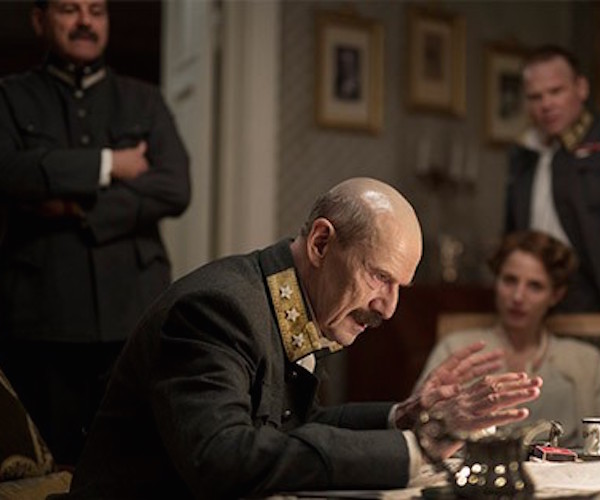Film Review: “The King’s Choice” — Norway’s Stand Against Hitler
The King’s Choice is a beautifully photographed and thoughtful nail-biter, a suspenseful historical drama
The King’s Choice directed by Erik Poppe. Screening at Kendall Square Cinema, Cambridge, MA.

Jesper Christensen as King Haakon VII in “The King’s Choice.”
By Peg Aloi
Even those of us with a more than rudimentary understanding of 20th century world history probably don’t have a detailed grasp on Scandinavia’s involvement in world wars. These are countries with progressive politics, socialist policies, political neutrality, and generally offer an excellent quality of life to their citizens, right? But their strategic location, specifically Norway’s, made them valuable targets in Hitler’s European invasion. The new film The King’s Choice tells the thrilling story of what happened when Germany attempted to invade and annex Norway in 1940.
The King of Norway was an elected official with little to no political power; the narrative details how he became a vital lynchpin in Norway’s response to Hitler’s onslaught. On the film, Germany’s envoy proclaims that he seeks a diplomatic solution; the defensive tactics and schemes raised in the meetings between the King and Prime Minister are civil and carefully orchestrated. The bottom line is that the only viable options appear to be surrender or invasion. The history books tell us how the maneuvering ended, of course — but I’m betting you didn’t know.
King Haakon VII (Jesper Christensen, in a quietly compelling performance) is a figurehead, but he takes his position very seriously. Archival footage at the film’s opening reveal the average Norwegian citizen’s love for the man and his family. This is a leader who found himself facing grave challenges that might have doomed the entire nation if not handled effectively. Hitler and his operatives clearly saw that appealing to the King, who had no viable political authority, would be a means to undermine the government and military’s actions in response to Germany’s plans. In the role of Germany’s envoy, Curt Bräuer, Karl Markovics is convincingly manipulative — yet he also conveys compassion for the King’s dilemma. These meetings are fraught with tension yet also a dutiful respect for the noble machinery of diplomacy. Underneath all the polite talk the stakes are very high during this extraordinary stand-off. There is real, if subdued, terror alight in everyone’s eyes: the royals, the government and the citizens.
Still, despite the film’s political scope, the narrative often feels intimate and immediate, thanks in part to strong performances, compelling moments of character revelation, and creative camera work. At first, the director’s choice to use handheld and constantly moving cameras during the film’s more urgent moments strike an odd note in a historical drama. But the visual motion ends up working well, ramping up the drama as events unfold.
This is Erik Poppe’s debut as a feature film director, and he has come up with an ambitious and brave rendering of a complex, and somewhat obscure, historical topic. Plenty of films, in many languages, have explored the underpinnings, machinations, and aftermath of World War 2. But from a Norwegian perspective? The screenplay focuses on the King’s devotion to his country and his family, as well as his personal integrity. He made a promise never to decide Norway’s fate on his own, but to let the people exercise their own sovereignty. But, as the film’s title indicates, the King cannot leave crucial, eleventh hour decisions to the Norwegian people. He must make choices with their best interests at heart. Things do not end well, but the man’s dignity and integrity somehow overshadow the chaos of invasion as well as the shame of surrendering to Hitler.
The film seems to conclude with a series of titles that explain what happened after those fateful days in 1940. But don’t grab your light fall jacket and your candy wrappers just yet; a final coda goes into what occurred years later, after stability and nobility were restored in Norway’s royal family.
I must admit that I found The King’s Choice difficult to follow at times. It comes off as a Norwegian version of a Chekhov script; a great many characters vie for dramatic attention and focus in a complex web of intrigue and expository information. Still, the film turns out to be a beautifully photographed and thoughtful nail-biter, suspenseful in a way that illuminates what must have been Norway’s most terrifying moments. This is a historical thriller that proffers a memorable vision of a country navigating fear, helplessness, and doom on the knife’s edge of the apocalypse.
Peg Aloi is a former film critic for The Boston Phoenix. She taught film and TV studies for ten years at Emerson College, and currently teaches at SUNY New Paltz. Her reviews also appear regularly online for The Orlando Weekly and Diabolique. Her long-running media blog “The Witching Hour” has recently been moved to a new domain: themediawitch.com.
